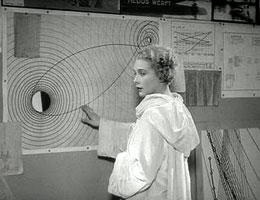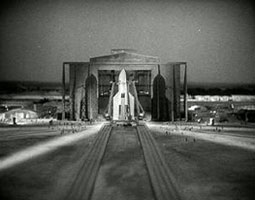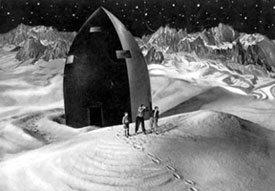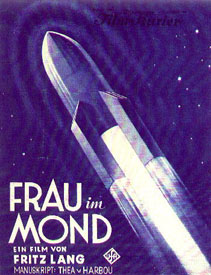 Fritz Lang's Woman in the Moon (1929) was scripted by Lang from a story by his wife Thea Von Horbou, who also wrote the script then novelization for her husband's Metropolis (1924). Fritz Lang's Woman in the Moon (1929) was scripted by Lang from a story by his wife Thea Von Horbou, who also wrote the script then novelization for her husband's Metropolis (1924).
The cinematography is tremendous for the angles, shadows, & staging of Moon, but it's very much secondary to the extraordinary achievement of Metropolis.
The impoverished Professor Manfeldt (Klaus Pohl) has only one chair in his tiny apartment, & that's missing a leg. He also has a pet mouse, which lives loose in the wall. The professor is the guy from whom Einstein got his haircut idea.
For all his poverty & apparent failure in life, Manfeldt is a scientific genius. His friend Wolf Helius (Willy Fritsch) can't stand that such a brilliant man has been ostracized due to daring ideas.
The professor's research is stolen by others who want to reach the moon, the mountains of which are made of gold. Turner (Fritz Rasp) the horrid villain is based a bit on the French pulp & cinema villain Fantomas; he is the man who orchestrated the theft. He's a notorious criminal mastermind & master of disguise, working for a cartel of four men & one cigar-chomping woman who want to control the world's gold reserves.
 The Cartel also stole the results of Wolf Helius's unmanned rocket experiments, such as were used to map the far side of the moon. The moon's far side as it happens has an atmosphere that makes it habitable to man. The Cartel also stole the results of Wolf Helius's unmanned rocket experiments, such as were used to map the far side of the moon. The moon's far side as it happens has an atmosphere that makes it habitable to man.
After way too long a time wasted on the conspiracy stuff reminiscent of Lang's tedious Testament des Dr. Mabuse (1933), some of the good people & the villainous join forces, & the moon journey finally gets under way.
The rocket is a gorgeous art deco affair that would've delighted Hugo Gernsbach. It's rolled out on enormous tracks & the camera lingers on it for maximum attention. This is some of the loveliest miniature work of the silent era, & long after.
The astronauts include Helius, Frau Hippolt (Margarete Kupfer), the professor, & a woman who contributed mostly to an unimportant love story subplot, Friede Velten (Gerda Maurus). The professor brings his mouse, Josephine. There's also a little boy stowaway, Gustav (Gustle Gstettenbaur), the helpful street urchin who collects Nick Carter science fiction pulps.
It's a rough journey because, as we're informed, intertia works differently in space. The weightless FX are cute, including how to drink wine from a glass in a weightless enviornment. The "science" is often a hoot, & yet it does incorporate the idea of a break-away three-stage rocket that decades later really would be the basis of getting into space.
In fact the rocket models were so well researched & brilliantly constructed that upon the rise of the Nazis to power (forcing Lang to flee to Hollywood, rightly abandoning his wife who sad to say liked the Nazis), these models were confiscated by the Gestapo who considered the designs state secrets too similar to V-2 rockets.
 They land on the far side of the moon & teset the air to make sure it's safe to breathe, then begin to explore the dusty surface. Professor Manfeldt in his diving suit went out even before they knew the air was good, & wearing that suit he's just about as cute as his mouse. They land on the far side of the moon & teset the air to make sure it's safe to breathe, then begin to explore the dusty surface. Professor Manfeldt in his diving suit went out even before they knew the air was good, & wearing that suit he's just about as cute as his mouse.
Striking matches is the extent of the scientific testing that proves the oxygen is good, so it's off with his helmet. The professor finds caverns of gold, but from greed falls into a crevice. Turner the villain goes psycho & is killed by Frau Hippolt.
Alas there's not enough oxygen for them all to make it back. Haus or Wolf must remain on the moon. They draw straws. Haus pulls the short straw but oh the drama of it, it's Wolf who stays, with one final filip to leave ya smilin'.
If Metropolis is the standard, then Woman on the Moon is lightweight, as a story just isn't there. Otherwise it's a delightful film, important to the history of filmic science fiction, with special effects in advance of their time, visually lovely even through the dull bits.
The film was a box office failure in its day because Lang refused to believe the silent era was over. If people could've heard those rockets firing off, they'd've lined up.
copyright © by Paghat the Ratgirl
|

